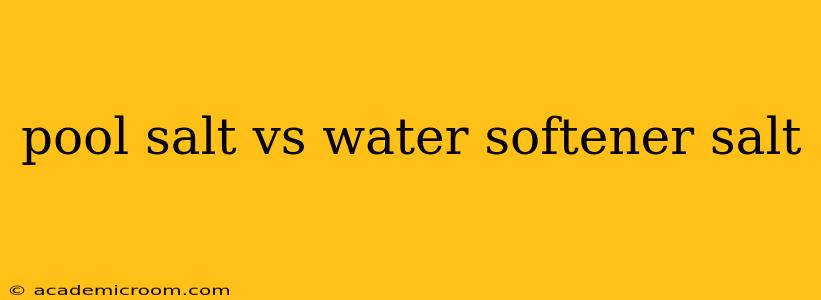Choosing the right salt for your needs can be confusing, especially when it comes to pool salt and water softener salt. While both are sodium chloride (NaCl), there are key differences that make them unsuitable for interchangeable use. This article will clarify the distinctions and help you understand which type of salt is best for your specific application.
What is Pool Salt?
Pool salt, also known as swimming pool salt, is specifically designed for use in saltwater chlorination systems for swimming pools. It undergoes a purification process to remove impurities that could harm pool equipment or negatively affect water quality. These impurities include calcium, magnesium, and other minerals which can cause scaling or cloudiness in the pool. High-quality pool salt is typically 99% pure sodium chloride. The purity level is crucial for the efficient operation of the chlorinator and maintaining a clean, sparkling pool.
What is Water Softener Salt?
Water softener salt, also called water conditioning salt, is used in home water softener systems to regenerate the ion-exchange resin. While it's also primarily sodium chloride, it often contains higher levels of impurities compared to pool salt. These impurities, although generally harmless for water softening, can be detrimental to pool equipment. Water softener salt may also contain anti-caking agents to prevent clumping, which are not always suitable for pool systems.
Can I Use Water Softener Salt in My Pool?
No, you should not use water softener salt in your swimming pool. The impurities in water softener salt can cause several problems:
- Cloudy water: The higher mineral content can lead to cloudy or hazy pool water.
- Scale buildup: Minerals can deposit on pool surfaces, equipment, and plumbing, leading to costly repairs.
- Damage to pool equipment: Impurities can clog or damage the saltwater chlorinator, reducing its efficiency and lifespan.
- Uneven chlorine production: The inconsistent purity can affect the chlorine generation process, leading to imbalances in pool chemistry.
While using pool salt in a water softener might seem possible, it's generally not recommended. Pool salt is more expensive, and the purity level might not be necessary for water softening. Using pool salt in a water softener won't damage the unit, but it's economically inefficient.
What are the Key Differences Between Pool Salt and Water Softener Salt?
Here's a table summarizing the key differences:
| Feature | Pool Salt | Water Softener Salt |
|---|---|---|
| Purity | 99% or higher sodium chloride | Typically lower purity, may contain impurities |
| Impurities | Minimized to prevent equipment damage & cloudy water | Higher levels of impurities are acceptable |
| Cost | Generally more expensive | Generally less expensive |
| Additives | Usually no additives except anti-caking agents in some cases | Often contains anti-caking agents |
| Application | Saltwater pool chlorination systems | Home water softener systems |
How to Choose the Right Salt
The choice is simple:
- For your swimming pool: Always use pool salt specifically designed for saltwater chlorination systems.
- For your water softener: Use water softener salt, as it's more cost-effective and designed for that purpose.
Using the correct type of salt ensures the proper functionality of your equipment and maintains the optimal water quality for its intended use.
What are the benefits of using the correct type of salt?
Using the correct type of salt offers several key benefits:
- Extended equipment lifespan: Properly purified salt protects your pool equipment or water softener from damage caused by impurities.
- Optimal performance: The right salt ensures efficient operation of the system, leading to better water quality and less maintenance.
- Cost savings: Preventing damage to equipment can save money on repairs or replacements in the long run.
- Consistent water quality: Using the correct salt prevents cloudy water, scaling, and other water quality issues.
By carefully selecting the appropriate salt for your specific application, you can ensure the longevity of your equipment and maintain consistently clean, healthy water.
